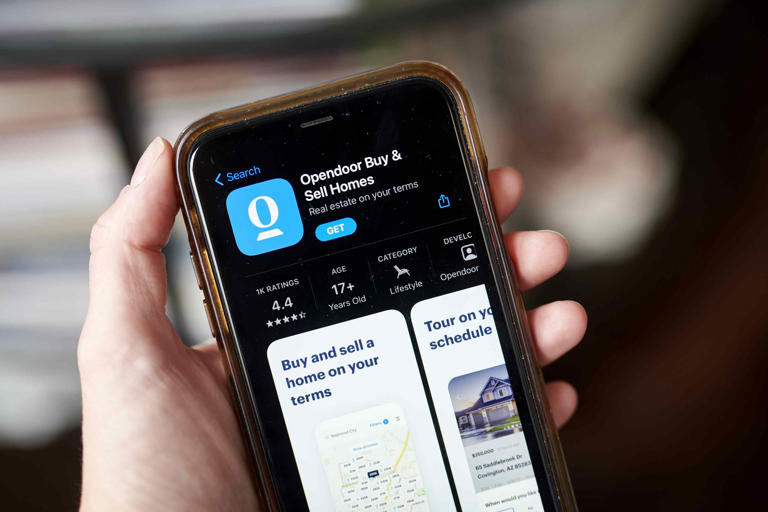Opendoor Shares Plunge Over 20% After Disappointing Outlook Despite Recent Stock Surge
Opendoor Shares Plunge Over 20% After Disappointing Outlook Despite Recent Stock Surge
By
David Goldfarb
Last updated:
August 6, 2025
First Published:
August 6, 2025

Photo: MSN
Opendoor’s Stock Crashes After Earnings Miss: Strategic Shift and Market Headwinds in Focus
After a sharp rally that saw Opendoor Technologies (NASDAQ: OPEN) shares soar nearly 500% since early July, the momentum came to an abrupt halt Tuesday as the company’s Q2 earnings and guidance failed to meet investor expectations. Shares tumbled over 20% in after-hours trading, erasing much of the recent speculative surge driven by new investor interest and bullish forecasts.
CEO Carrie Wheeler, addressing the spike in attention, said during the earnings call:
“We appreciate your enthusiasm for what we’re building, and we’re listening intently to your feedback. This increased visibility is an opportunity to tell our story to a broader audience.”
From Penny Stock to Market Buzz: A Quick Climb, a Sudden Fall
Opendoor, a tech-driven real estate platform specializing in iBuying—purchasing homes directly from sellers and reselling them for profit—had seen its shares collapse to just $0.51 in late June. At that point, the company was even considering a reverse stock split to stay compliant with Nasdaq listing rules.
But things turned around dramatically in July when hedge fund manager Eric Jackson disclosed a stake in the company and publicly predicted that the stock could soar to $82. That announcement reignited speculative trading, pushing the stock to $2.52 at Tuesday’s close, before it dropped below $2 after earnings were announced.
Financial Results: A Mixed Quarter With Warning Signs
For the second quarter of 2025, Opendoor posted:
- Revenue: $1.57 billion — a 4% increase YoY
- Net Loss: $29 million or $0.04 per share, improved from a $92 million loss or $0.13 per share a year earlier
- Homes acquired: 1,757 — significantly lower than 3,504 in Q3 of 2024
Despite the year-over-year improvement in net losses, guidance for Q3 2025 disappointed, with the company projecting:
- Revenue: $800 million to $875 million — representing a 36%+ decline YoY
- Homes acquired: just 1,200 units, down from Q2 and less than half of last year’s third quarter volume
Housing Market Slump Continues to Weigh Heavily
CFO Selim Freiha was candid in explaining the poor forward outlook:
“Persistently high mortgage rates continue to suppress buyer demand, leading to lower clearance and record new listings. The housing market has further deteriorated over the last quarter.”
With 30-year mortgage rates hovering near 7%, the affordability crisis has sidelined buyers and dramatically reduced transaction volumes—conditions that hurt Opendoor’s core business model.
A Strategic Pivot: Moving Beyond iBuying
In an attempt to counter macroeconomic headwinds and the capital-heavy nature of its iBuying operations, Opendoor is now shifting focus to a referrals-based model. CEO Wheeler described the change as:
“The most important strategic shift in our history.”
This move is intended to reduce capital risk, improve margins, and make the company less vulnerable to housing market cycles by acting more as a platform than a buyer.
However, some analysts remain skeptical. While the shift could eventually stabilize cash flow, it also represents a significant transformation of Opendoor’s original business thesis—one that will take time to prove out.
Investor Sentiment: Hope Meets Reality
The recent rally was driven by optimism, particularly from retail and momentum investors. But the fundamentals haven’t yet caught up, and the Q3 guidance painted a sobering picture of the road ahead.
Still, Wheeler remains optimistic about the attention the company is receiving:
“We intend to make the most of this increased visibility.”
Bottom Line
Opendoor’s latest earnings call served as a reality check for investors swept up in the recent rally. While the company is making moves to adapt in a challenging environment, deteriorating housing conditions and slow revenue recovery mean the turnaround remains uncertain.
As Opendoor embarks on its strategic pivot, investors will be watching closely to see if the company can deliver sustained growth and profitability—or if the enthusiasm was premature.
Popular articles
Subscribe to unlock premium content
Global Cultures and the Hidden Drivers of Productivity and Happiness

The Future of Personalized Medicine

Digital Nomads and the New Global Economy

Global Cultures and the Hidden Drivers of Productivity and Happiness

The Future of Personalized Medicine

Global Cultures and the Hidden Drivers of Productivity and Happiness









